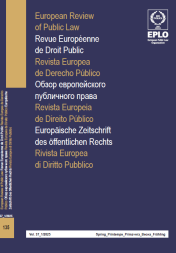
Empirical Creatures in a Normative World: AI and Law
Leonor Moral Soriano
Professor at the University of Granada, Public Law Department, Spain
The interest of legal science in artificial intelligence technologies seems to focus on the unlimited capacities and innumerable applications that they have in law. This contribution wants to reveal the limits of AI in law and argues that AI is an empirical creature that does not project normativity in the world of law. For this, I focus on a nuclear feature of law: legal argumentation. Specifically, I analyze the use of automated decision-making systems in the justification of administrative acts. This object must be studied from the perspective of administrative law as a normative system, and from the theory of legal argumentation as a conceptual framework for the application of law. The aim of this theoretical framework is not to assimilate AI to legal norms, neither to find its accommodation in the normative system; it rather claims that the normative content (in practical terms) of legal reasoning will determine the use we make of AI in law.
Keywords: Automated decision-making systems; motivation of administrative acts; legal argumentation theory; context of discovery and context of justification
L’intérêt de la science juridique pour les technologies d’intelligence artificielle semble se concentrer sur les capacités illimitées et les innombrables applications qu’elles ont en droit. Cette contribution vise à révéler les limites de l’IA en droit et soutient que l’IA est une créature empirique qui ne projette pas de normativité dans le monde du droit. Pour ce faire, je me concentre sur une caractéristique essentielle du droit: l’argumentation juridique. Plus précisément, j’analyse l’utilisation des systèmes automatisés de prise de décision dans la justification des actes administratifs. Cet objet doit être étudié dans la perspective du droit administratif en tant que système normatif et de la théorie de l’argumentation juridique en tant que cadre conceptuel d’application du droit. L’objectif de ce cadre théorique n’est pas d’assimiler l’IA aux normes juridiques, ni de trouver sa place dans le système normatif; il prétend plutôt que le contenu normatif (en termes pratiques) du raisonnement juridique déterminera l’usage que nous ferons de l’IA en droit.
Mots-clés: Systèmes automatisés de prise de décision; motivation des actes administratifs; théorie de l’argumentation juridique; contexte de découverte et contexte de justification
*This contribution is an updated version in English of the article “Criaturas empíricas en un mundo normativo: la inteligencia artificial y el derecho” that was published in: Revista de Derecho Público: teoría y método, ISSN-e 2695-7191, vol. 7, 2023, pp. 151-174 and is herein published with permission. The core of this contribution was presented at the annual EGPL Conference on “Digital Transformation: Technology, Fundamental Rights, Public Administration”, in September 2023. I received the financial support of the research project Gobernanza de la educación (GO-Education) PID2021-126869OB-I00, funded by MCIN/AEI/10.13039/501100011033 FEDER/EU, and the research project Citizens Based Artificial Intelligence Governance (GOIA) TED2021-12940B-C22, State Plan for Scientific, Technical, and Innovation Research 2021-2023, European Union NextGenerationEU/PRTR.





















